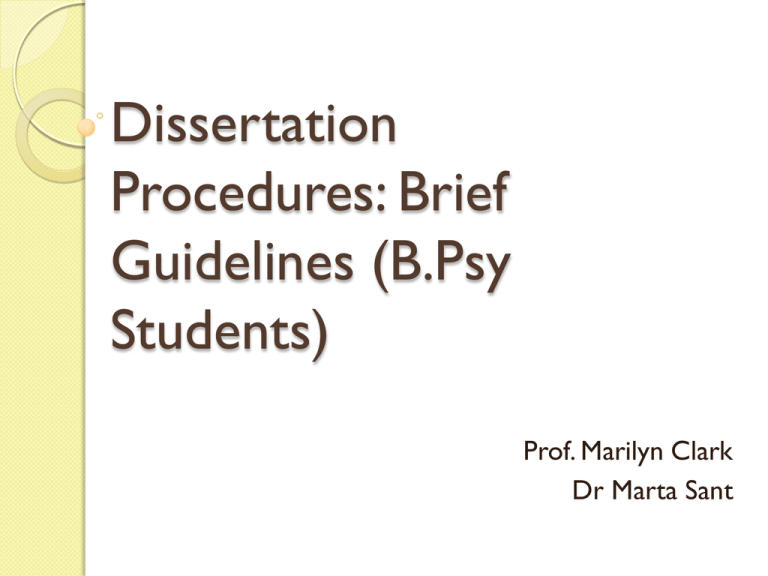Dissertation Procedures: Brief Guidelines (B.Psy Students)
advertisement

Dissertation Procedures: Brief Guidelines (B.Psy Students) Prof. Marilyn Clark Dr Marta Sant What is the Dissertation? All B.Psy students are required to submit a dissertation with the work value of 12 ECTS ◦ significantly more than any other course in the undergraduate psychology programme. The dissertation is an empirical study of a psychological nature (10,000 words) Dissertations are submitted in the third year of studies, normally after the Easter Holidays Dissertations are co-ordinated and regulated by a Committee appointed by and responsible to the Department of Psychology. The Dissertation: Aims & Objectives The aim of the undergraduate psychology dissertation is to provide students with a learning experience in undertaking empirical research in a psychological area of inquiry. The principal objective of the dissertation is to teach students the skills and competencies required to negotiate the entire research process, from the study of literature, to formulating a research proposal and satisfying ethical requirements, to the gathering and analysis of data, and finally to the writing up and submission of a research report. Students are expected to be active learners and to find ways to sustain their own learning throughout this project. The Dissertation: Basic Structure Dissertations are divided into chapters that ◦ review the literature in which the study and the research question are located ◦ the methodology that has been adopted by the student to furnish an answer to the research question ◦ a result section that presents the findings ◦ a discussion of the findings in light of the research question and the literature reviewed ◦ an introductory and concluding section. The Dissertation Process: 3 Basic Steps The Research Proposal 1. • to be completed and submitted in the first semester of second year (Deadline: Monday 30th November 2015) The UREC ethics form 2. • to be completed and submitted once the Research Proposal has been assessed and accepted by the Dissertations Committee Submitting your dissertation 3. • to be submitted in the second semester of third year Stage 1: Research Proposal Brief description of the area you are interested to research Your preferred methodology Area of psychology in which you would like to further your interest ◦ ◦ ◦ ◦ ◦ ◦ Social psychology Clinical psychology Counselling psychology Educational psychology Neuropsychology Forensic psychology Then identify a topic of research that you would like to study in your preferred area Stage 1: Research Proposal Familiarise yourself with key literature that will enable you to ask good empirical questions for psychological research You would need to access articles on Hydi and other relevant textbooks in order to inform your understanding and knowledge Stage 1: Research Proposal – Finding a Supervisor You need to have solicited the services of a research supervisor Ideally try and find a supervisor whose experience and background is related to your topic of study You are first advised to approach full-time members of the Psychology Department to request supervision Then you may approach part-timers If you would like to approach anyone who is not included on the list, you are required to have this person authorised by the Dissertations Board Stage 1: Research Proposal – Finding a Supervisor Link to Dissertation Supervisor List & Procedures 2015 http://www.um.edu.mt/__data/assets/pdf_file/0 009/253278/Dissertation_Supervisor_List_an d_Procedure_2015_1.pdf It is important to secure a research supervisor as soon as possible ◦ leaving it to the last minute might mean they you will have difficulties securing a research supervisor of your choice, as s/he may have taken on other students The Research Supervisory Relationship Supervision is aimed towards assisting students learn about the process of undertaking research Your relationship with your supervisor will undoubtedly prove an important part of your learning experience Your supervisor should be able to guide you into learning more about your area as well as how to conduct research into your area of interest It is worth making sure that your supervisor is in a position to supervise your project, both in terms of expertise and in terms of resources You should not expect your supervisor to provide any resources Supervisors’ expertise is not a substitute for reading and conducting a thorough literature review, although supervisors may well guide students as to what literature is noteworthy in their chosen area The undertaking of a dissertation remains the student’s sole responsibility Stage 1: Research Proposal – Completing the BPSY Dissertation Proposal Form Once you have found a supervisor, you will proceed to writing your research proposal Your supervisor’s guidance is crucial at this stage and therefore you should meet regularly You are required to complete and submit the BPSY Dissertation Proposal Form and the Ethical Awareness Form (Deadline: Monday 30th November 2015) ◦ http://www.um.edu.mt/__data/assets/pdf_file/0012/ 219000/Dissertation_proposal.pdf ◦ http://www.um.edu.mt/__data/assets/pdf_file/0009/ 218997/Ethical_awraness_form.pdf Stage 1: Research Proposal – Completing the BPSY Dissertation Proposal Form Proposals need to be reviewed by supervisors, who will provide students with relevant feedback Upon submission, proposals require the signed endorsement of supervisors, which indicates to the Dissertations Committee that the supervisor has reviewed the proposed study and approved the procedure outlined for its execution in the proposal. Guidelines for writing a good proposal ◦ Ideas need to follow a logical and clear sequence ◦ Tone should display an impartial scientific attitude ◦ Be aware of your own preconceived notions about an issue and be mindful of your biases ◦ Clearly defined aims of the study ◦ Clear research question ◦ Clear rationale for this study – why is this study important and why are you undertaking it? ◦ Brief mention of knowledge of previous literature in the area (this is why you need to access relevant literature in order to inform your understanding of your chosen area) Guidelines for writing a good proposal ◦ State the methodology you are using. The methodology needs to complement the research question (e.g. avoid trying to apply a qualitative methodology to a research question that requires a quantitative methodology) ◦ Rationale for chosen methodology ◦ State how you will recruit participants and if you intend recruiting them from an institution then which one ◦ State number of participants, their age range, gender, characteristics ◦ State how you will elicit your data (e.g. questionnaires, interview guides) ◦ State how you will analyse the data ◦ Attention to grammar and spelling Be realistic... You essentially have only two years to plan a project ◦ therefore be mindful of time limitations e.g. A qualitative research interviewing 50 participants is not feasible e.g. Collecting 1000 questionnaires Your research should be feasible and manageable Ethical Considerations As undergraduate students, you should not engage in research that is highly sensitive or that requires the recruitment of vulnerable participants ◦ e.g. Exploring the impact of sexual abuse ◦ e.g. Mothers’ experiences of child suicide ◦ e.g. Prisoners’ perspectives of incarceration At undergraduate level, the Psychology Department does not teach students the skills and competencies of psychotherapy ◦ Therefore research with vulnerable populations (such as individuals in therapy, or research concerning past abuse) is strongly discouraged. Research must be ethical and not in violation of any ethical standards of good practice in psychological research. Therefore... 1. 2. 3. 4. 5. 6. Decide on an area of study and attempt to formulate a research agenda and research approach Identify a potential supervisor from the full time members on the list Make an appointment and meet with that member of staff If any member of staff is unable to take you on, discuss this with the full time expert in the area and identify an alternative from the part-time potential tutors on the list Secure a commitment of supervision and together with the supervisor, complete the Research Proposal Form and Ethical Awareness Form Submit these forms to the Psychology Office Room (Deadline: Monday 30th November 2015) Proposal Submission Submitting your proposal ◦ Supervisor’s signature must be present on the Research Proposal Form and Ethical Awareness Form in order to ensure that that s/he is aware of and in agreement with what you have stated on your proposal ◦ Please ensure that you have photocopied these forms (including your supervisor’s signature) for your personal records prior to submission The Dissertations Board ◦ The Research Proposal Forms and the Ethical Awareness Forms will be reviewed by the members of the Dissertations Board ◦ After all proposals are viewed by the Dissertations Board, they will be marked accordingly and returned to students ◦ The Board will advise on subsequent course of action ◦ The Board will provide reasons for its decisions at all times and will instruct on further action that needs to be taken by the student The Dissertations Board: Outcome Students whose Research Proposal Forms have been marked (1) Accepted but resubmit with amendments or (2) rejected need to resubmit their proposals with the required changes ◦ In this case, your supervisor will guide you to make the advised changes and needs to sign the revised proposal to show that s/he is in agreement with and aware of the changes made ◦ Then you must resubmit your original proposal, together with the revised proposal, clearly highlighting the changes made. ◦ Your re-submitted proposal will be reviewed by the Board and you will be informed of the outcome ◦ PLEASE ENSURE THAT YOU HAVE COPIES OF EVERYTHING PRIOR TO RESUBMISSION Please note that... If you decide to make any changes after your proposal has been accepted, please inform the Chair of the Dissertation committee (marta.sant@um.edu.mt) as soon as possible.You might be required to resubmit your proposal if changes made are significant. No change will be allowed in the proposed topic of the dissertation after mid-December of the third year. The Dissertations Board: Outcome Upon approval, the Dissertations Committee will indicate whether the study also requires University Research Ethics Committee ethical clearance. Students will be able to fully embark on their projects once they gather all necessary approvals. Qualitative research studies will be required to apply for UREC ethical clearance Quantitative studies in which participants may be identified or which explore sensitive topics will also require UREC ethical clearance. Ethical Clearance for Research from the University Research Ethics Committee The Dissertations Board will indicate whether a student is required to submit an ethics form to the Faculty Research Ethics Board (FREC) ◦ N.B.THIS IS NOT THE SAME AS THE ETHICAL AWARENESS FORM FREC is an independent committee and not related to the Dissertations Board If you are required to submit an ethics form to FREC you will need to go through the FREC procedure Ethical Clearance for Research from the University Research Ethics Committee Students are required to submit an ethics form to the Faculty Research Ethics Board (FREC) in the first instance, and thereafter from the University Research Ethics Committee (UREC). Therefore You need to access and read the following document carefully: 1. Guidelines for UoM Research Ethics Committee ◦ http://www.um.edu.mt/__data/assets/pdf_file/000 8/53396/ethicsguidelines.pdf Then you are required to read the following form carefully and complete it 1. Proposal Form for Ethical Clearance for Research from the University Research Ethics Committee ◦ http://www.um.edu.mt/__data/assets/pdf_file/0004/ 108670/proposalformlatest.pdf Proposal Form for Ethical Clearance for Research from the University Research Ethics Committee Ensure that you have included all the required information. It is advisable to discuss this with your supervisor in detail Your supervisor is required to sign all supporting documents e.g. Consent forms, interview schedule, information sheets etc If you are recruiting participants through an agency or NGO, a consent form signed by the agency is required Information sheets, interview schedules, consent forms and questionnaires are required to be presented in Maltese and English You need to demonstrate that you are sensitive to the possibility of coercion during the recruiting of participants and that you will do everything in your power to avoid it at all costs Important: You must not collect any data until you have received UNCONDTIONAL ETHICAL APPROVAL from UREC. You are required to provide your supervisor with written evidence from FREC/UREC confirming that you have received unconditional ethical approval prior to collecting any data Documentation All relevant documentation can be found on the Department of Psychology’s homepage, by clicking on ‘Documents Related to the Dissertation’. ◦ http://www.um.edu.mt/socialwellbeing/psychol ogy/notices/documents_related_to_the_disse rtation It is your responsibility to access the documents and read them carefully. Plagiarism Please note that cases of suspected plagiarism and other intellectual dishonesty will be immediately referred to the Rector’s office as dictated by regulations governed by disciplinary action. Finally... Any information or queries regarding the dissertation procedures can be addressed by appointment with Dr Marta Sant or via email marta.sant@um.edu.mt Queries regarding content and format need to be addressed to your supervisors. Please always include and use your UNIVERSITY email address when completing any dissertation-related documentation and when you are liaising with supervisors or other members of staff Acknowledgements Prof Marilyn Clark Dr Gordon Sammut


